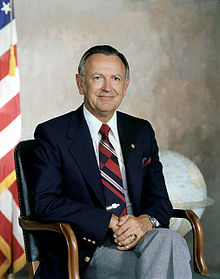Chris Kraft
| Christopher C. Kraft Jr. | |
|---|---|

Chris Kraft as director of Johnson Space Center in 1979
|
|
| Born |
Christopher Columbus Kraft Jr. February 28, 1924 Phoebus, Virginia, U.S. |
| Alma mater | Virginia Tech, B.S. 1944 |
| Occupation |
NASA flight director Director of Johnson Space Center |
| Spouse(s) | Betty Anne Kraft (m. 1950) |
| Children | 2 |
| Awards |
ASME Medal (1973) Roger W. Jones Award for Executive Leadership (1979) |
Christopher Columbus "Chris" Kraft Jr. (born February 28, 1924) is a retired American NASA engineer and manager who was instrumental in establishing the agency's Mission Control operation. Following his graduation from Virginia Tech in 1944, Kraft was hired by the National Advisory Committee for Aeronautics (NACA), the predecessor organization to the National Aeronautics and Space Administration (NASA). He worked for over a decade in aeronautical research before being asked in 1958 to join the Space Task Group, a small team entrusted with the responsibility of putting America's first man in space. Assigned to the flight operations division, Kraft became NASA's first flight director. He was on duty during such historic missions as America's first manned spaceflight, first manned orbital flight, and first spacewalk.
At the beginning of the Apollo program, Kraft retired as a flight director to concentrate on management and mission planning. In 1972, he became director of the Manned Spacecraft Center (later Johnson Space Center), following in the footsteps of his mentor Robert R. Gilruth. He held the position until his 1982 retirement from NASA. During his retirement, Kraft has consulted for numerous companies including IBM and Rockwell International, and he published an autobiography entitled Flight: My Life in Mission Control.
More than any other person, Kraft was responsible for shaping the organization and culture of NASA's Mission Control. As his protégé Glynn Lunney commented, "the Control Center today ... is a reflection of Chris Kraft." In 2011, the Mission Control Center building was named after him. When Kraft received the National Space Trophy from the Rotary Club in 1999, the organization described him as "a driving force in the U.S. human space flight program from its beginnings to the Space Shuttle era, a man whose accomplishments have become legendary."
...
Wikipedia
